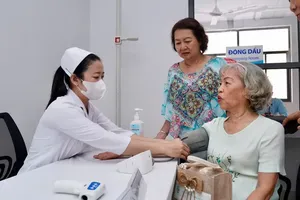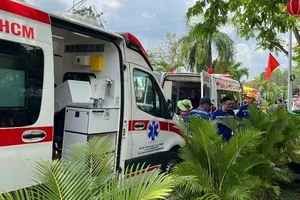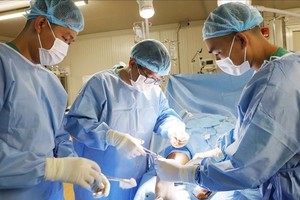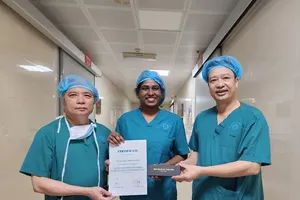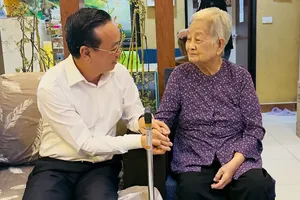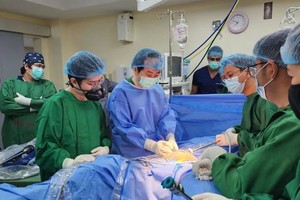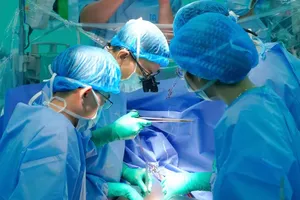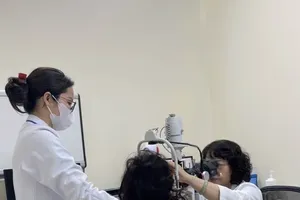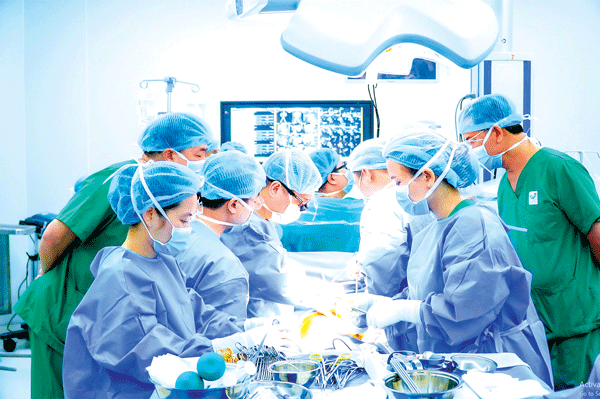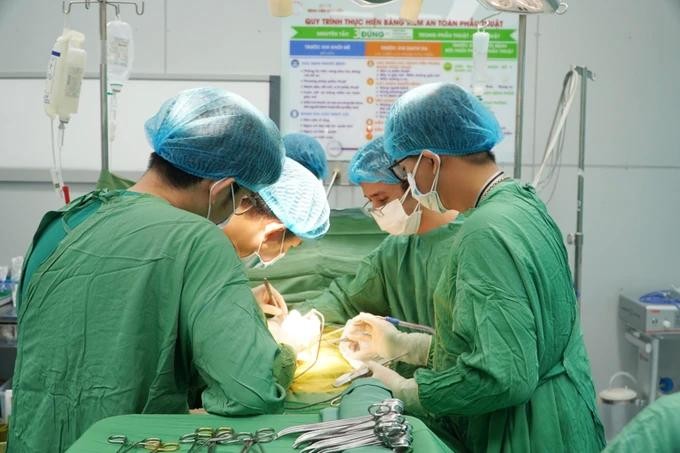
Currently, the two main barriers to organ transplants are the scarcity of organs and the issue of medical costs. The financial burden associated with organ transplant surgery and post-transplant treatment, which is a lifelong commitment, is a significant challenge for many individuals with limited financial resources.
On the night of 24 August to the early morning of 25 August, the first heart transplant at the University of Medicine and Pharmacy Hospital in Ho Chi Minh City was successfully completed with the maximum concentration of the surgical team, anaesthesia and resuscitation, and numerous support forces.
At 3:00 a.m., the heart of the donor from Hanoi commenced its first cardiac cycle in the chest of 37 year old man residing in the Central Highlands Province of Gia Lai with severe heart failure. Following a five-day period following the heart transplant, the male patient demonstrated clear signs of recovery, including the ability to eat and engage in conversation. His life was transformed with the implantation of a new heart, yet he was obliged to continue with anti-rejection therapy.
In early July, Children's Hospital 2 in Ho Chi Minh City performed a liver transplant on a three-year-old girl with Budd-Chiari syndrome, a rare condition characterised by obstruction of the hepatic veins. The donor was a 37-year-old woman from Binh Thuan Province. Her husband is employed as a bricklayer, and she is the primary caregiver for her ailing child, who has been hospitalized for the past two years. The hospital and medical team have provided comprehensive support for the surgery, and the child has survived.
The mother moaned the family will face difficulties in the upcoming time as the infant will require anti-rejection medication for the remainder of her life.
Dr. Tran Thanh Tri, Head of the Hepatobiliary and Pancreatic Department at Children's Hospital 2 in Ho Chi Minh City, revealed that the average cost of a liver transplant at this facility is VND600 million-VND700 million. Approximately one-third of this cost is covered by health insurance with the remaining portion being the responsibility of the family.
Indeed, the high cost represents a significant barrier for impoverished patients requiring organ transplants. A considerable number of families have taken out mortgages on their homes and borrowed money from various sources in an attempt to prolong the lives of their loved ones who are suffering from organ failure. At Cho Ray Hospital, there are cases where patients have undergone major surgery with costs of less than VND20 million, despite the total cost being in the hundreds of millions of Vietnamese dong.
Head Le Minh Hien of the Social Work Department at Cho Ray Hospital stated that upon verification of the patient's circumstances, the hospital frequently contacts benefactors to request assistance, thereby ensuring the scheduled surgical procedure can proceed as planned.
Meanwhile Dr. Du Thi Ngoc Thu, Head of the Human Organ Transplant Coordination Unit at Cho Ray Hospital, said that organs donated by brain-dead donors must be allocated to recipients who are most medically compatible with that organ, irrespective of the recipient's identity or economic status. Nevertheless, the financial burden associated with organ transplantation remains a significant concern, particularly for individuals with limited financial resources who have been undergoing treatment for an extended period.
Medical experts have also acknowledged that the current level of health insurance coverage for organ transplant surgery is insufficient. According to statistical data, the total cost of a liver transplant at the 108 Military Central Hospital is approximately VND 1 billion, with health insurance coverage amounting to only VND 200 million. Similarly, a lung transplant at the Central Lung Hospital costs between 1.1 and VND 1.3 billion, with the hospital bearing the burden of nearly VND1 billion.
Another big difficulty is that the cost of donating and taking organs from living donors is still not covered by health insurance, including evaluation and testing of living donors (all costs are paid by the recipient), organ removal and washing (medicine, supplies, surgeons), post-transplant care (post-surgery, follow-up examinations).
Dr. Du Thi Ngoc Thu proposed that health insurance should bear the full financial burden of organ transplant patients, including 100 percent coverage of the donor's costs during the emergency resuscitation phase. In the long term, a policy should be implemented to provide care and support for post-transplant patients, with the objective of improving their quality of life, facilitating their integration into the workforce, and enabling them to contribute to society in a productive manner.
In the meantime, Deputy Director of Hue Central Hospital Dr. Nguyen Thanh Xuan has pointed out that there is currently no specific policy in place regarding the payment of costs associated with transportation, resuscitation, and brain death diagnosis. Additionally, there are no specific regulations pertaining to the rights of organ donors and their families.
It is therefore imperative to develop a pricing structure for organ transplants, which should serve as the basis for health insurance payments. This structure should be applied to all medical facilities nationwide and should include a policy of immediate payment for all costs associated with organ retrieval, healthcare and recovery following the donation. In addition, periodic health check-ups for donors should be covered.
Furthermore, experts proposed the establishment of a humanitarian support fund to assist financially disadvantaged patients, donors, and alleviate the burden on medical facilities engaged in organ retrieval and transplantation. This would facilitate broader access to organ transplantation, a vital avenue for extending the lives of patients, particularly those from economically disadvantaged backgrounds.
Deputy Minister of Health Tran Van Thuan said that there are currently 26 hospitals across the country that have successfully performed organ transplants, and the medical community has attained proficiency in organ transplant techniques. Nevertheless, there is currently no established mechanism or policy for consulting activities on organ donation from individuals who are brain-dead or heart-dead.
Furthermore, the costs associated with resuscitation, brain-dead diagnosis, organ retrieval, preservation, coordination, and transportation, as well as the costs of performing technical services related to organ transplants, have not been uniformly established.
This situation presents a significant challenge for hospitals, particularly those that have received organ donations.
